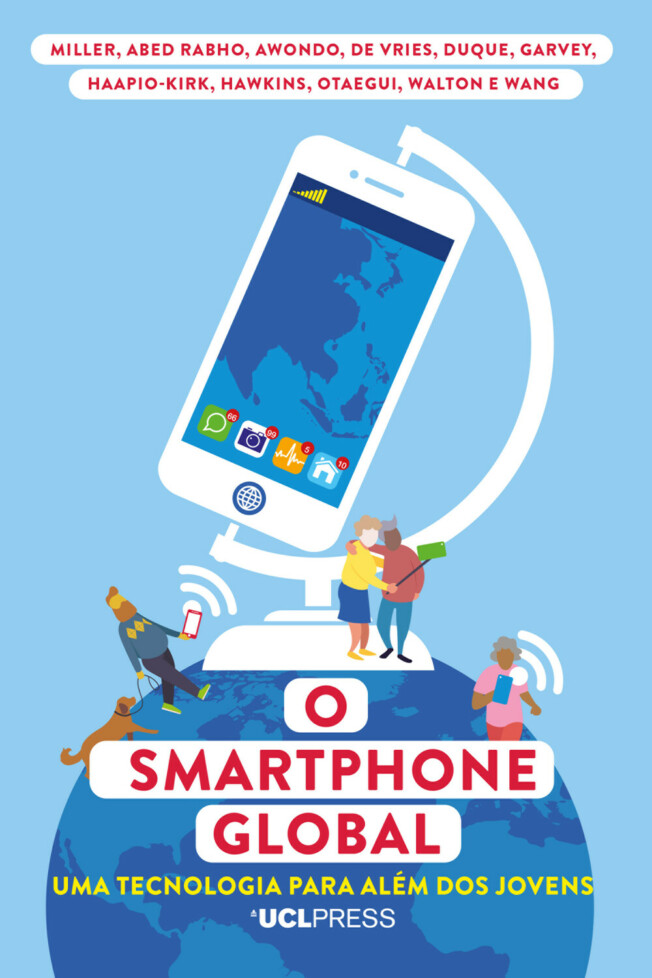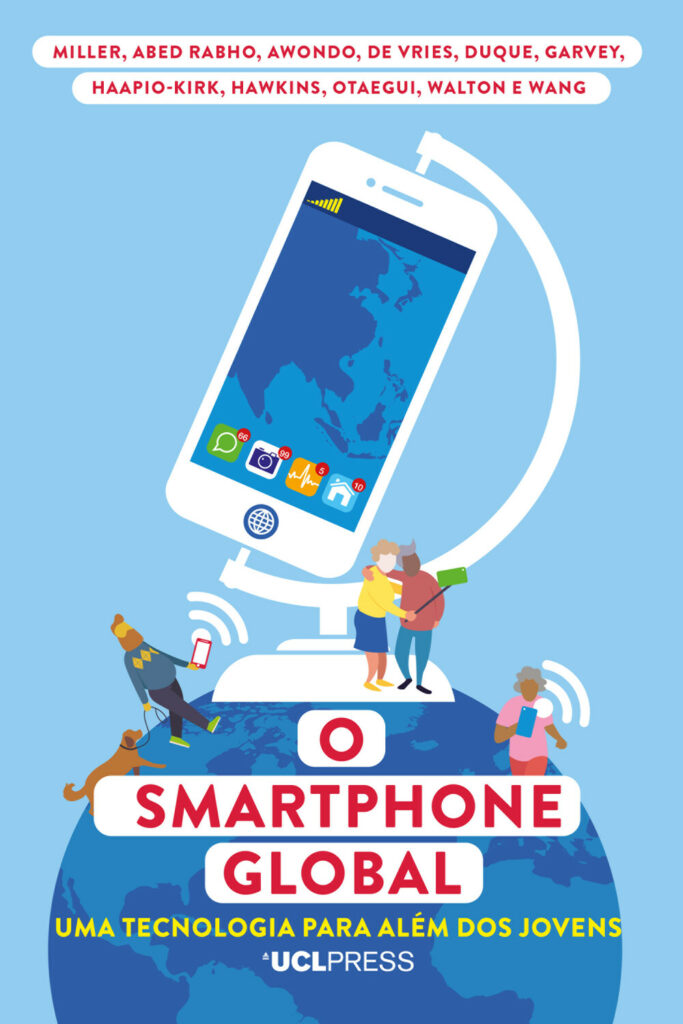
O Smartphone Global: Uma tecnologia para além dos jovens
A Portuguese Translation of The Global Smartphone
Daniel Miller (Author), Laila Abed Rabho (Author), Patrick Awondo (Author), Maya de Vries (Author), Marília Duque (Author), Pauline Garvey (Author), Laura Haapio-Kirk (Author), Charlotte Hawkins (Author), Alfonso Otaegui (Author), Shireen Walton (Author), Xinyuan Wang (Author), Cecília Elisabeth Barbosa Soares (Translator)
Series: Ageing with Smartphones
O smartphone está tão frequentemente debaixo de nosso nariz, que assumimos saber o que ele é. Mas sabemos mesmo? Para descobrir, 11 antropólogos realizaram pesquisa de campo de 16 meses em países da África, Ásia, Europa e América do Sul, tendo como foco pessoas mais velhas.
O livro O Smartphone Global apresenta perspectivas inéditas a partir desta pesquisa comparativa. A primeira descoberta é: os smartphones não são mais uma tecnologia restrita aos jovens, estando nas mãos de todos, independente da idade. Além disso, observou-se uma grande ambivalência entre aquilo que as pessoas falam sobre os smartphones e os modos como elas os usam na prática. Os smartphones se tornaram tanto um lugar em que vivemos, como apetrechos que providenciam um tipo de “oportunismo perpétuo”, por estarem sempre conosco. Vão além de um “repositório de aplicativos”. São um dispositivo sem precedentes em termos de potencial de transformação, assimilando rapidamente valores pessoais. Para compreender esse processo, considerou-se um leque de nuances nacionais e culturais, como a comunicação visual na China e no Japão, o dinheiro móvel em Camarões e Uganda, e acesso a informação sobre saúde no Chile e na Irlanda – juntamente com trajetórias variadas em relação ao envelhecimento em Al-Quds, no Brasil e na Itália. É dessa perspectiva global, e a partir do mapeamento de contextos diversos, que o livro se propõe a responder à pergunta O que é um smartphone? e a analisar suas consequências.
DOI: 10.14324/111.9781800081512
Number of illustrations: 105
Publication date: 25 February 2022
PDF ISBN: 9781800081512
Daniel Miller (Author) 
Daniel Miller is Professor of Anthropology at University College London. He previously led the Why We Post project on the use and consequence of social media and the ASSA project on smartphone use amongst older people. These resulted in 20 volumes published by UCL Press.
Laila Abed Rabho (Author)
Laila Abed Rabho is a researcher at the Harry S. Truman Institute for the Advancement of Peace.
Patrick Awondo (Author)
Patrick Awondo is a lecturer at the University of Yaoundé 1.
Maya de Vries (Author)
Maya de Vries is Postdoctoral Researcher at the Hebrew University of Jerusalem.
Marília Duque (Author) 
Marília Duque is a researcher at ESPM (Escola Superior de Propaganda e Marketing) in São Paulo, Brazil.
Pauline Garvey (Author) 
Pauline Garvey is Associate Professor of Anthropology at Maynooth University, Maynooth, Co. Kildare, Ireland. Her research interests include material culture, consumption, design, and Nordic domesticity before her more recent interest in digital anthropology and ageing. Recent publications include a special issue of the Journal of Design History titled 'Design Dispersed', edited with Adam Drazin (2016), and a monograph entitled Unpacking IKEA: Swedish Design for the Purchasing Masses (2018). Research for this work was funded by the Irish Research Council and The Swedish Institute.
Laura Haapio-Kirk (Author) 
Laura Haapio-Kirk is Junior Research Fellow in Social Anthropology at Christ Church, University of Oxford.
Charlotte Hawkins (Author) 
Charlotte Hawkins is Postdoctoral Researcher in Social Anthropology. Her work focuses on social economies of mental health and wellbeing.
Alfonso Otaegui (Author)
Alfonso Otaegui is Assistant Professor at the Anthropology Department of the Pontifical Catholic University of Chile. He completed his PhD in Social Anthropology and Ethnology at the École des Hautes Études en Sciences Sociales (EHESS).
Shireen Walton (Author)
Shireen Walton is Lecturer in Anthropology at Goldsmiths, University of London.
Xinyuan Wang (Author) 
Xinyuan Wang is Research Fellow at the Centre for Digital Anthropology at University College London. She is author of Social Media in Industrial China and Ageing with Smartphones in Urban China, both published by UCL Press.
Cecília Elisabeth Barbosa Soares (Translator)
Related titles
Como o Mundo Mudou as Mídias Sociais
Daniel Miller, Elisabetta Costa, Nell Haynes, Tom McDonald, Razvan Nicolescu, Jolynna Sinanan, Juliano Spyer, Shriram Venkatraman, Xinyuan Wang,
14 August 2019
The Global Smartphone
Daniel Miller, Laila Abed Rabho, Patrick Awondo, Maya de Vries, Marília Duque, Pauline Garvey, Laura Haapio-Kirk, Charlotte Hawkins, Alfonso Otaegui, Shireen Walton, Xinyuan Wang,
06 May 2021
How the World Changed Social Media
Daniel Miller, Elisabetta Costa, Nell Haynes, Tom McDonald, Razvan Nicolescu, Jolynna Sinanan, Juliano Spyer, Shriram Venkatraman, Xinyuan Wang,
29 February 2016
O Smartphone Global: Uma tecnologia para além dos jovens
A Portuguese Translation of The Global Smartphone
O smartphone está tão frequentemente debaixo de nosso nariz, que assumimos saber o que ele é. Mas sabemos mesmo? Para descobrir, 11 antropólogos realizaram pesquisa de campo de 16 meses em países da África, Ásia, Europa e América do Sul, tendo como foco pessoas mais velhas.
O livro O Smartphone Global apresenta perspectivas inéditas a partir desta pesquisa comparativa. A primeira descoberta é: os smartphones não são mais uma tecnologia restrita aos jovens, estando nas mãos de todos, independente da idade. Além disso, observou-se uma grande ambivalência entre aquilo que as pessoas falam sobre os smartphones e os modos como elas os usam na prática. Os smartphones se tornaram tanto um lugar em que vivemos, como apetrechos que providenciam um tipo de “oportunismo perpétuo”, por estarem sempre conosco. Vão além de um “repositório de aplicativos”. São um dispositivo sem precedentes em termos de potencial de transformação, assimilando rapidamente valores pessoais. Para compreender esse processo, considerou-se um leque de nuances nacionais e culturais, como a comunicação visual na China e no Japão, o dinheiro móvel em Camarões e Uganda, e acesso a informação sobre saúde no Chile e na Irlanda – juntamente com trajetórias variadas em relação ao envelhecimento em Al-Quds, no Brasil e na Itália. É dessa perspectiva global, e a partir do mapeamento de contextos diversos, que o livro se propõe a responder à pergunta O que é um smartphone? e a analisar suas consequências.

